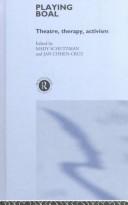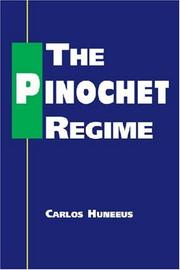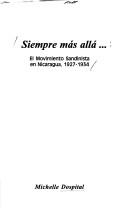| Listing 1 - 10 of 46 | << page >> |
Sort by
|

ISBN: 1135127751 0203350057 1283965682 1135127689 9781135127688 9780203350058 9781135127824 1135127824 9781135127756 041522988X 9780415229883 0415229898 9780415229890 9781283965682 Year: 2001 Publisher: London ; New York : Routledge,
Abstract | Keywords | Export | Availability | Bookmark
 Loading...
Loading...Choose an application
- Reference Manager
- EndNote
- RefWorks (Direct export to RefWorks)
Hamlet and the Baker's Son is the autobiography of Augusto Boal, inventor of the internationally renowned Forum Theatre system, and 'Theatre of the Oppressed' and author of Games for Actors and Non-Actors and Legislative Theatre. Continuing to travel the world giving workshops and inspiration to teachers, prisoners, actors and care-workers, Augusto Boal is a visionary as well as a product of his times - the Brazil of military dictatorship and artistic and social repression and was once imprisoned for his subversive activities. From his early days in Brazil's poli
Theatrical producers and directors --- Dramatists, Brazilian --- Boal, Augusto. --- Boal, Augusto
Book
ISBN: 9892611586 9892611616 Year: 2017 Publisher: Coimbra University Press
Abstract | Keywords | Export | Availability | Bookmark
 Loading...
Loading...Choose an application
- Reference Manager
- EndNote
- RefWorks (Direct export to RefWorks)
Nascido em 1883, no ano da publicação de Assim Falou Zaratustra e damorte do compositor alemão Richard Wagner, o jornalista e diplomataAugusto de Castro viria a deparar-se na vida, como o próprio afirmoumais tarde, com “deliciosas ironias”. Assim, enquanto Zaratustrapertenceu a um dos autores mais apreciados por Benito Mussolini –ditador italiano de quem Castro foi admirador confesso no decorrer dasprimeiras décadas do século xx e nascido, também ele, em 1883 –, já o desaparecimento do criador de Parsifal, deu o mote para um dos artigosmais nostálgicos de Augusto de Castro, que intitulou a sua penúltimaobra, Há oitenta e três anos em Veneza (1966).Nesta obra propõe-se umaviagem pela vida de Augusto de Castro, figura marcante da vidadiplomática, política e cultural do século XX português, que acompanhoude perto as principais mudanças vivenciadas pelo país e que privou comalguns dos principais atores políticos, económicos e culturais da cenanacional e internacional do seu tempo.
Portuguese --- Castro, Augusto de, --- De Castro, Augusto, --- Castro Sampaio Corte-Real, Augusto de,
Book
ISBN: 146964598X 9781469645988 9780807890806 Year: 1969 Publisher: Chapel Hill, Baltimore, Md. : University of North Carolina Press Project MUSE,
Abstract | Keywords | Export | Availability | Bookmark
 Loading...
Loading...Choose an application
- Reference Manager
- EndNote
- RefWorks (Direct export to RefWorks)

ISBN: 1134884702 1280321415 9786610321414 0203419715 9780203419717 6610321418 0415086086 0415086078 9780415086073 9780415086080 9781134884704 9781134884650 1134884656 9781134884698 1134884699 Year: 1994 Publisher: London ; New York : Routledge,
Abstract | Keywords | Export | Availability | Bookmark
 Loading...
Loading...Choose an application
- Reference Manager
- EndNote
- RefWorks (Direct export to RefWorks)
The first book to examine the practical techniques of Augusto Boal, Playing Boal illuminates and invigorates discussion about Boal's work and the transformative potential of theatre.
Theater --- Political aspects. --- Boal, Augusto. --- Boal, Augusŭtto --- Pinto Boal, Augusto
Book
ISBN: 2371540277 2907163795 Year: 2017 Publisher: Paris : Éditions de l’IHEAL,
Abstract | Keywords | Export | Availability | Bookmark
 Loading...
Loading...Choose an application
- Reference Manager
- EndNote
- RefWorks (Direct export to RefWorks)
Le Chili qui est apparu au travers de l'arrestation du général Pinochet, le 16 octobre 1998, à Londres, n'est pas un pays simple. Ce n'est pas pour autant un pays incompréhensible. Il est le résultat d'une période particulière : celle de la transition à la démocratie, commencée en 1988, et qui s'achève en mars 1994. L'étude de la période de transition à la démocratie revêt une importance singulière en ceci qu'elle impose de comprendre la nature du régime qui la précède, le régime militaire, et qu'elle permet de saisir la nature du régime qui lui succède, la nouvelle démocratie chilienne. Le régime militaire du général Pinochet a été triple : répressif, personnel, mais également révolutionnaire, par la construction d'un régime jusque là inconnu au Chili. Le plébiscite du 5 octobre 1988 devait constituer « le second étage de la fusée » de l'institutionnalisation politique de la dictature : il provoquera le basculement vers la démocratie. Ce moment crucial de l'histoire moderne chilienne amorce la lecture historique de la période Pinochet, tout en ouvrant les perspectives d'un régime démocratisé. Fondé sur la négociation et le consensus, il a permis un changement du régime, et non un changement de régime. La transition négociée à la chilienne est présentée ici à travers ses détails, et donc ses techniques institutionnelles, juridiques ou politiques, dans un ouvrage de recherche nourri d'enquêtes directes auprès des acteurs de la période - à commencer par des entretiens avec le général Pinochet et les acteurs de la transition.
Democracy --- Démocratie --- Pinochet Ugarte, Augusto --- Chile --- Chili --- Politics and government --- Politique et gouvernement --- Democratization --- Pinochet Ugarte, Augusto. --- Ugarte, Augusto Pinochet --- Pinochet, Augusto --- Pinochet U., A. --- Pinuoqi --- institutions politiques --- Augusto Ugarte Pinochet

ISBN: 9781588264060 1588264068 9781626371583 162637158X Year: 2007 Publisher: Boulder, Colorado : Lynne Rienner Publishers,
Abstract | Keywords | Export | Availability | Bookmark
 Loading...
Loading...Choose an application
- Reference Manager
- EndNote
- RefWorks (Direct export to RefWorks)
This seminal book was inspired by a series of questions: What explains the endurance of Augusto Pinochet's authoritarian regime in Chile, a country with a lengthy democratic tradition? What mechanisms secured the regime's political stability and broad-based support? What role did neoliberal ideas play in authoritarian discourse and policy? How could two such opposite forces as political coercion and economic freedom coexist? And why the fascination with Pinochet's personality and leadership among elites and lower-income sectors alike? Carlos Huneeus's authoritative work explores and reveals the very nature of the Pinochet regime, examining its structures, its policies, and the complex of factors that made its lengthy duration possible. At the same time, it sheds welcome light on the nature of Chilean democracy today.
Authoritarianism --- Autoritarisme --- History --- Histoire --- Pinochet Ugarte, Augusto. --- Chile --- Chili --- Politics and government --- Politique et gouvernement --- Political science --- Authority --- Ugarte, Augusto Pinochet --- Pinochet, Augusto --- Pinochet U., A. --- Pinuoqi --- Pinochet Ugarte, Augusto
Book
ISBN: 9798890864253 1469672758 146967274X Year: 2022 Publisher: Chapel Hill : Editorial A Contracorriente,
Abstract | Keywords | Export | Availability | Bookmark
 Loading...
Loading...Choose an application
- Reference Manager
- EndNote
- RefWorks (Direct export to RefWorks)
"This book investigates the experience of political prisoners under dictatorial regimes in Paraguay, Brazil and Argentina during the second part of the 20th century. The analysis illuminates certain unique events that occurred in the dungeons of the dictatorship, such as escapes and liberations, to think about the impact of the revolutionary imaginary in the construction of political subjectivity, narratives about leftist militancy and historical memory. These prison events marked the moment of greatest strength and greatest weakness of the revolutionary project: on the one hand, they challenged and outwitted ferocious dictatorships, and on the other, they exposed the political fantasies of the left that preceded the subsequent catastrophic defeat. The reading hypothesis is that the distance between the great revolutionary event, which never took place, and these singular events that seemed to "confirm" its arrival, has been inserted as a modus operandi of political subjectivation, disarticulating the horizon of contemporary radical transformation"--
Politics in literature. --- Prisoners in literature. --- Political prisoners --- Political prisoners' writings --- Latin American literature --- History and criticism. --- Puig, Manuel. --- Boal, Augusto. --- Roa Bastos, Augusto,
Book
ISBN: 0299316130 9780299316136 9780299316105 0299316106 9780299316143 0299316149 Year: 2018 Publisher: Madison, Wisconsin : The University of Wisconsin Press,
Abstract | Keywords | Export | Availability | Bookmark
 Loading...
Loading...Choose an application
- Reference Manager
- EndNote
- RefWorks (Direct export to RefWorks)
In Santiago's urban shantytowns, a searing history of poverty and Chilean state violence have prompted grassroots resistance movements among the poor and working class from the 1940s to the present. Underscoring this complex continuity, Alison J. Bruey offers a compelling history of the struggle for social justice and democracy during the Pinochet dictatorship and its aftermath. As Bruey shows, crucial to the popular movement built in the 1970s were the activism of both men and women and the coalition forged by liberation-theology Catholics and Marxist-Left militants. These alliances made possible the mass protests of the 1980s that paved the way for Chile's return to democracy, but the changes fell short of many activists' hopes. Their grassroots demands for human rights encompassed not just an end to state terror but an embrace of economic opportunity and participatory democracy for all. Deeply grounded by both extensive oral history interviews and archival research, Bread, Justice, and Liberty offers innovative contributions to scholarship on Chilean history, social movements, popular protest and democratization, neoliberal economics, and the Cold War in Latin America.
Poor --- Government, Resistance to --- Human rights workers --- Political activists --- Protest movements --- Chile --- History --- Pinochet Ugarte, Augusto.
Book
Abstract | Keywords | Export | Availability | Bookmark
 Loading...
Loading...Choose an application
- Reference Manager
- EndNote
- RefWorks (Direct export to RefWorks)
Painting, Italian --- Painting, Modern --- Painting --- Private collections --- Giovanardi, Augusto, --- Giovanardi, Francesca Marzoli, --- Morandi, Giorgio, --- Art Collections

ISBN: 8492186305 2821846193 Year: 1996 Publisher: Centro de estudios mexicanos y centroamericanos
Abstract | Keywords | Export | Availability | Bookmark
 Loading...
Loading...Choose an application
- Reference Manager
- EndNote
- RefWorks (Direct export to RefWorks)
“Cuando se empieza una lucha, uno cree saber cuál es la niela final pero, a medida que la lucha avanza y se intensifica, uno se va dundo cuenta de que la meta no era el final sino más bien el verdadero principio, y que el logro de la meta, al erradicar un mal forzosamente también ocasiona problemas.”
Regions & Countries - Americas --- History & Archaeology --- Latin America --- Sandino, Augusto César, --- Frente Sandinista de Liberación Nacional --- History. --- Nicaragua --- History --- Sandino, A. C. --- Sandino, César Augusto, --- Sandino, Augusto Nicolás Calderón, --- FSLN --- F.S.L.N. --- Sandinist National Liberation Front --- Sandinista National Liberation Front --- movimiento sandinista
| Listing 1 - 10 of 46 | << page >> |
Sort by
|

 Search
Search Feedback
Feedback About UniCat
About UniCat  Help
Help News
News